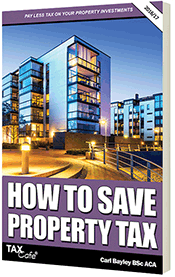Buy to Let Tax Advice Guide
Helping Landlords Pay Less Income Tax & Capital Gains Tax on their Letting Property
Taxcafe has been helping buy to let investors with their tax planning for over 20 years.
We have a range of tax advice guides that cover all the main tax issues : calculating capital gains tax and income tax, tax deductible expenses and how to reduce your tax bill.
Our main buy to let tax guide is How to Save Property Tax. We've been publishing this book since 2002 and improved and expanded it by speaking to property investors and seeing what tax information they want most.
You can read the latest edition here: How to Save Property Tax.
Another popular guide we publish is called Using a Property Company to Save Tax. This guide explains the pros and cons of putting your rental properties into a company.
If you already own a property company, this guide shows you how to make the most of it. It covers ALL the expenses property companies can claim, how to save tax when you extract money from your company and all the tax reliefs that can be claimed when properties are sold.
You can read the latest edition here: Using a Property Company to Save Tax.
Buy to let Income Tax
Many landlords have high taxable rental profits which are subject to income tax. If you have income from another source (such as a job or another business) there's a good chance you will be paying 40% or 45% income tax on these profits.
The easiest way to reduce your tax bill is by claiming all the tax deductible expenses you can. Some are obvious like mortgage interest (subject to various restrictions), property repairs and letting agent fees. But there are also lots and lots of other expenses that buy to let landlords can claim and these are fully covered in our guide How to Save Property Tax.
More complex tax planning can also be carried out in some circumstances. For example, it may be worth transferring properties to your spouse if he or she pays income tax at a lower rate than you do - eg 20% versus 40%.
Looking at tax deductible expenses, we are always amazed how many landlords do not claim all the expenses to which they are entitled, for example the cost of using your car in your property rental business and all the expenses related to running a home office.
Those that do claim certain types of expense often do not claim enough.
What the guide does not contain is aggressive tax avoidance advice, just tried and tested tax planning information. The author, Carl Bayley FCA, is a chartered accountant who has been advising property investors for over 40 years. He was Chairman of the Tax Faculty at the Institute of Chartered Accountants in England and Wales (ICAEW) from 2015 to 2018 and served as a member of the institute's governing council from 2003 to 2023.
Buy to Let Capital Gains Tax
Capital gains tax is arguably the tax that property investors fear most. Although the top rate of CGT (24%) is much lower than the top income tax rate (45%), the amounts involved are usually significant.
Capital gains tax is complex but there is also a huge amount of scope to do constructive tax planning.
Our guide How to Save Property Tax contains a huge amount of CGT planning info. We explain how its calculated and all the tried and tested techniques you can follow to reduce your tax bill.
Each tax planning idea is accompanied by at least one real life example.






